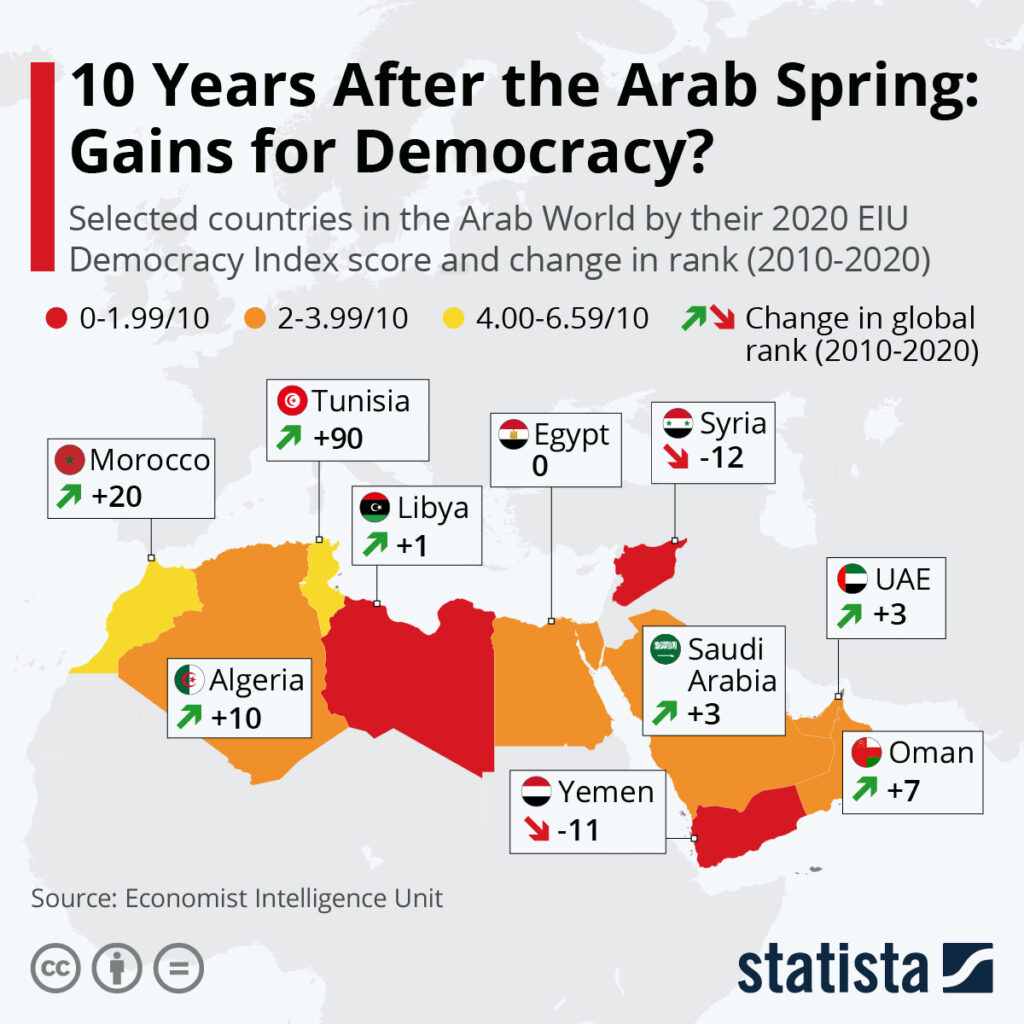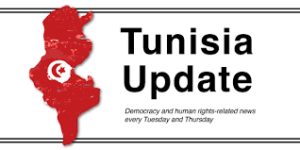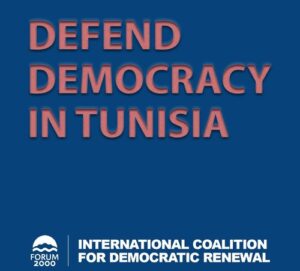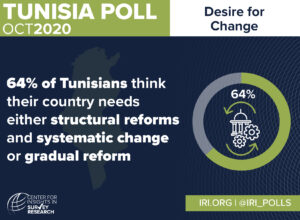
Tunisia’s independent media regulator this week closed a television station, Nesma TV, owned by the Heart of Tunisia party leader Nabil Karoui, and a religious radio station, saying both were operating with a license, Reuters reports:
The stations have been critical of President Kais Saied, who seized executive power in July in a move his opponents describe as a coup. The HAICA had also earlier this month closed Zaytouna, which was also unlicensed and critical of Saied. Nesma and the Quran Kareem religious radio station have operated for years without a licence, irking media watchdogs that see them as illicit tools for political influence.
In countries which experienced regime change during the Arab Spring, outcomes are widely differing ten years later, highlighting the volatility that can come with sudden political change, Statista’s Katharina Buchholz observes.
Tunisia, where the government of President Zine El Abidine Ben Ali was overthrown in the beginning of 2011, achieved a rating of 6.59 out of 10 in the Economist Intelligence Unit Democracy Index (above), climbing 90 ranks since 2010, while being named the 54th most democratic country in the world.

Credit: POMED
Ten years later, a bold move by Kais Saied may give Tunisia fledgling democracy a second chance, one observer suggests.
The appointment of Colonel-Major Khaled Yahyaoui, who is in charge of the president´s security and an officer of the highest republican integrity, to oversee the interior ministry till the formation of a new government, speaks of the president´s attachment to preserving individual liberties in Tunisia, argues Francis Ghilès, Senior Associate Researcher at Barcelona’s Centre for International Affairs.
Other senior security and army officers such as retired Admiral Kamel Akrout who recently called on Saied to invoke Article 80 of the Constitution and denounced the government´s intention to rent out state lands to Qatari investors, thus nipping the project in the bud, appear to be playing a supportive role in the move, he adds. Akrout, who hails from a humble family also said he was appalled by the fact that 25% of Tunisians lived in absolute poverty.
Contrary to some Western and Middle East media, most Tunisians do not see themselves or their president as burying a “democracy” whose promised economic and social benefits they never enjoyed, adds Ghilès. Many Tunisians see themselves and their president as fighting a state captured by corrupt political and business lobbies which were leading it to ruin.
But other observers detect regional autocratic powers playing a malign role behind the scenes.

ICDR Statement on the recent anti-democratic actions in Tunisia
As Saied’s transitional government struggles to secure a loan from the International Monetary Fund to make up for a major budget deficit, reports suggest that he’s already in talks with the petro-rich Emiratis and Saudis for a bailout, the Post reports:
Tunisia, has at times become the arena for a broader regional “Great Game” pitting Egypt, Saudi Arabia and the UAE against on-and-off geopolitical adversaries Qatar and Turkey. Those dynamics were most acutely on show in Tunisia’s neighbor, Libya, with the two camps backing rival warring factions amid tensions that spilled over into Tunisia’s domestic politics.
The future of Tunisia’s Islamist Ennahda movement’s will depend on how it redefines party-movement relations and its place vis-a-vis other actors and the public. Based on these factors, there seem to be three main potential pathways, argues analyst Bedirhan E. Mutlu:
- The first is the Egyptian scenario, in which the regime will experience a fall into authoritarianism and Ennahda will face severe oppression like the Muslim Brotherhood. This appears to be the least likely of scenarios. But should it happen, we can, once again, expect resilience. ..
- The second possibility is the return of electoral politics. Ennahda is at risk of being excluded from a new National Dialogue process and the political bargain, as some actors have hinted. … Polls conducted after the July 25 “coup” in Tunisia put Ennahda support at around 12 percent, providing evidence that the party can further diminish but still survive in the coming years.
- Lastly, Ennahda’s political deterioration or disappearance will not necessarily mean the disappearance of the interests, ideas, and policies it stands for. Political science literature suggests that political systems can be unstable with regards to party survival but the same issues and programs can survive in different parties from similar political positions.
 Tunisia: Political Conflict after July 25: The Program on Arab Reform and Democracy at CDDRL hosts a panel on the evolving political conflicts in Tunisia since the July 25 power grab executed by President Kais Saied widely characterized as a step toward authoritarian rule. Speakers: Achraf Aouadi is a Tunisian activist and academic that founded the watchdog organization I WATCH after the Tunisian Revolution in 2011. Saida Ounissi is a member of the Tunisian Assembly of People’s Representatives and previously served as Minister for Employment and Vocational Training. October 29, 2021 10:00 AM – 11:30 AM RSVP
Tunisia: Political Conflict after July 25: The Program on Arab Reform and Democracy at CDDRL hosts a panel on the evolving political conflicts in Tunisia since the July 25 power grab executed by President Kais Saied widely characterized as a step toward authoritarian rule. Speakers: Achraf Aouadi is a Tunisian activist and academic that founded the watchdog organization I WATCH after the Tunisian Revolution in 2011. Saida Ounissi is a member of the Tunisian Assembly of People’s Representatives and previously served as Minister for Employment and Vocational Training. October 29, 2021 10:00 AM – 11:30 AM RSVP
Tunisia Update: Police brutality is back in the spotlight after officers’ brutal, targeted attack on the director of an LGBT rights group. Meanwhile, authorities shut Nabil Karoui’s Nessma TV & radio station Quran Kareem for operating without a license – https://t.co/UlxwdaC9iS pic.twitter.com/hfxBANTDhL
— POMED (@POMED) October 28, 2021







